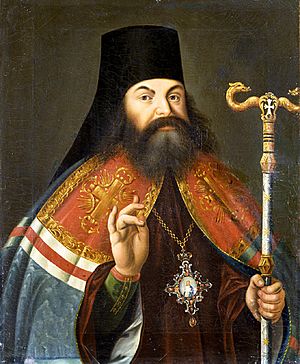Theophan Prokopovich facts for kids
Quick facts for kids |
|
|---|---|
| Metropolitan and archbishop of Moscow | |

A posthumous portrait from the mid-18th century
|
|
| Church | Russian Orthodox Church |
| See | Moscow |
| Enthroned | 1722 |
| Reign ended | 1736 |
| Predecessor | Stefan Yavorsky |
| Successor | Joseph Volchansky |
| Personal details | |
| Born | 18 June 1681 Kiev, Cossack Hetmanate, Tsardom of Russia |
| Died | 19 September 1736 (aged 55) St. Petersburg, Russian Empire |
Feofan Prokopovich (born June 18, 1681 – died September 19, 1736) was an important figure in the Russian Orthodox Church. He was a smart person who studied many things. He was a theologian, writer, poet, mathematician, and philosopher.
Feofan was from Ukraine. He was the head of the Academia Mohileana in Kiev. He also became an Archbishop. He helped Peter the Great change the Russian Orthodox Church. Feofan wrote many religious poems and famous speeches called sermons.
Contents
Feofan Prokopovich's Life Story
Early Life and Learning
Feofan Prokopovich was born in Kiev. His birth name was Eleazar or Elisei. Kiev was then part of the Cossack Hetmanate. This area was connected to the Tsardom of Russia. His father was a shopkeeper from Smolensk.
After his parents died, Eleazar was adopted. His uncle, Feofan Prokopovich, took him in. His uncle was important. He was the leader of the Kiev Brotherhood Epiphany Monastery. He was also a professor and the head of the Academia Mohileana.
Eleazar's uncle sent him to the monastery for school. After finishing primary school, he became a student at the Academia Mohileana.
Studies Abroad
In 1698, Eleazar finished his studies at Academia Mohileana. He then went to the Volodymyr Uniate Collegium. He lived in a Basilian monastery there. He became a Uniate monk and took the name Elisha.
A bishop named Zalensky saw how smart Elisha was. The bishop helped him move to Rome. He went to the Catholic Academy of St. Athanasius. This academy was for spreading Catholicism among Eastern Orthodox people.
In Rome, he could use the Vatican Library. Besides theology, he studied old Latin and Greek thinkers. He learned about history and the city of Rome. He also learned about the Catholic faith and the Pope. He read works by famous people like Tommaso Campanella and Galileo Galilei. He also learned about Nicolaus Copernicus.
On October 28, 1701, Prokopovich left Rome. He did not finish his studies there. He traveled through France, Switzerland, and Germany. He also studied in Halle. There, he learned about the ideas of the Protestant Reformation.
Coming Back to Russia
In 1704, Feofan returned to Ukraine. It was then part of the Tsardom of Russia. First, he went to Pochayiv Lavra. Then he went to Kiev. There, he left the Catholic Church. He joined the Orthodox monks. He took the name Feofan to honor his uncle.
From 1705, Feofan taught at the Kiev-Mogila Collegium. He taught about writing and thinking. He also wrote a play called "Vladimir." He gave this play to Hetman Ivan Mazepa. At this time, he wrote religious speeches. Important leaders in Kiev saw his work.
In 1707, he became the Prefect of the Kiev-Mogila Academy.
In 1711, Feofan gave a speech. It was for the anniversary of the Battle of Poltava. The Russian ruler, Peter I, was very impressed. When Peter returned to Kiev, he made Feofan Prokopovich the head of the Kiev-Mogila Academy. He also became a professor of theology. He also became the abbot of the Kiev Brotherhood Epiphany Monastery. He completely changed how theology was taught there.
In 1716, Feofan moved to Saint Petersburg. From then on, he spent his time explaining his new ideas. He also defended his changes from the church pulpit. Some Russian church leaders did not like him. They thought he was an outsider. But he became very important to the government.
He was made a bishop in 1718. In 1725, he became an archbishop of Novgorod. He died in Saint Petersburg.
Feofan wrote the rules for changing the Russian Orthodox Church. This was called the spiritual regulation. He helped create a new church department. This department took the place of the Patriarch. It was later called the Holy Governing Synod. Feofan was its vice-president.
Feofan did not like old beliefs and superstitions. He kept making changes even after Peter the Great died. He made Russian sermons simpler. He used everyday topics and a clear style.
See also
 In Spanish: Teófanes Prokopóvich para niños
In Spanish: Teófanes Prokopóvich para niños
 | Anna J. Cooper |
 | Mary McLeod Bethune |
 | Lillie Mae Bradford |

